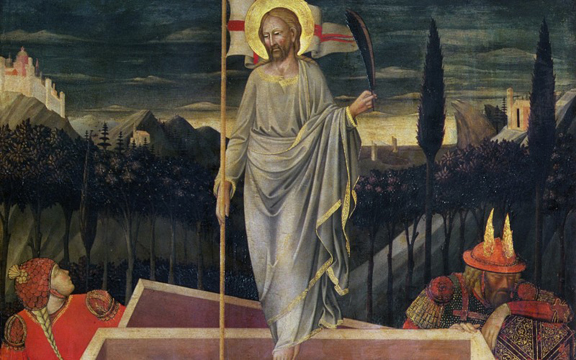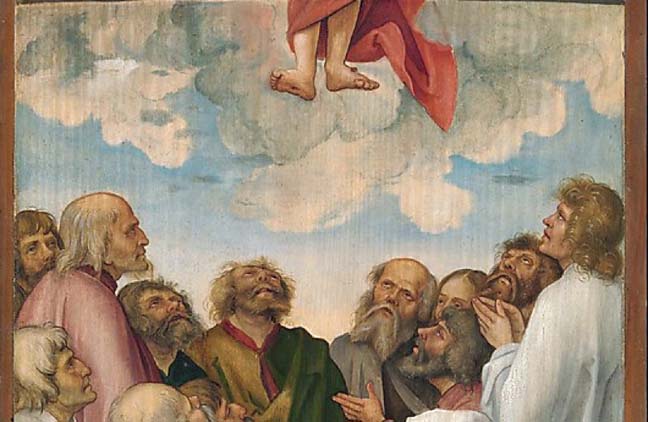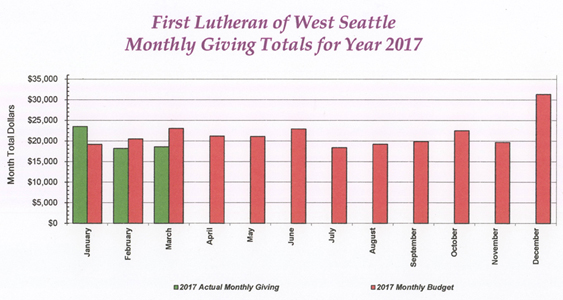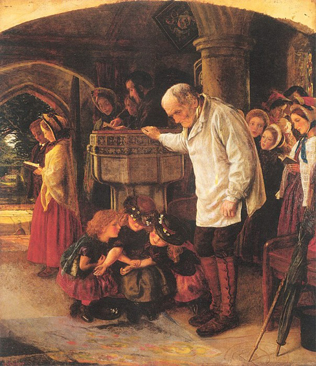May 2017
|
Ascension Aftermath
---------------------------------------------------------------------------------------------------------------------------------------------------------------------------------------
Living in a Small Church
On Thursday, May 25 we will celebrate the Feast of the Ascension
of Our Lord – when the risen Christ ascends into the clouds to
rule with his Father in heaven (Ephesians 1:20). Martin Luther
points out in one of his Ascension sermons from 1544 that after
Christ goes to his Father in heaven he leaves us his Spirit to
testify to Christ (John 15.26). What this means is that Christ’s
word or testimony will remain in the world, “no matter who hears
it.” Luther concludes by saying that “even if no one on earth
would accept it, nevertheless it must happen that the world is
rebuked through this preaching… because it… did not want to
believe” (Luther’s
Works
77:313).
From this sermon our faith is reinforced that few there are who
follow Christ (Matthew 7:14). So do not despair over a small
church. Rejoice instead that the testimony is never stopped but
continues until Christ returns. That is our Ascension victory.
Alleluia!
Pastor Marshall
|
|
Luther on Government
------------------------------------------------------------------------------------------------------------------------------------------------------------------------------------
Trusting & Disobeying
By Pastor Marshall
Martin Luther was resolute in believing in Romans 13:1–2:
So what do you do when your
government is corrupt? Luther addressed this question in his
fifty page treatise from 1523, “Temporal Authority: To What
Extent It Should Be Obeyed.” First he notes that because the
world is “un-Christian,” it must be “kept under external
constraint and compelled to keep the peace and do what is good.”
This is what the secular government does (Luther’s
Works 45:92–93). And
a Christian may even work for the government to make sure this
constraining takes place – “to restrain wickedness and to defend
godliness” (LW 45:103). In that sense we are to “take the risk
of entrusting matters to” our governments (LW 45:123).
However, if the government fails
to do its job, then we are free to disobey. And if in response
the government should “seize your property on account of this
and punish such disobedience, then blessed are you; thank God
that you are worthy to suffer for the sake of the divine word,”
knowing that the corrupt ruler “will meet his judge” (LW 45:112,
125).
Luther thought few secular rulers were worth their salt.
“If a prince should happen to be wise, upright, or a Christian,”
he wrote, “that is one of the great miracles, the most precious
token of divine grace upon the land” (LW 45:113). So he used
Psalm 107:40 to compel them to be responsible rulers: “God pours
contempt upon princes” (LW 45:116). So they’ve been warned. And
they better clean up their act or God will depose them!
Because that is his job and not
ours, the Christian should never join in overthrowing the
government. The Christian who revolts anyway, becomes “an
eternal firebrand of hell, for he bears the sword against God’s
word and is disobedient to him, and is a member of the devil” –
as were the peasants of Thuringia in their 1525 rebellion (LW
46:53–54). |
|
President’s Report…
by Bob Baker
CHRIST IS RISEN!
HE IS RISEN INDEED! As
we celebrate the redemptive message of Easter, we who identify
ourselves as followers of Christ Jesus, look to our efforts of
spreading the Word of the Gospel to the ends of the earth. Here
at FLCWS our collective efforts are managed by our Congregation
Council. I have been on the job as President less than three
months, and already I am aware of what an on-going concerted
effort that entails. So
let me express here a hearty “THANK YOU” to the conscientious
people who serve on our Council! I
know in Luke 17:10, Jesus says, “So you also, when you have done
all that is commanded you, say ‘We are unworthy servants; we
have only done what was our duty.’”
Also, I know a teacher who says (especially regarding students)
that “thank you” should only be used when someone has done you a
favor, rather than when someone has done what it was their
responsibility to do. In
April the Congregation Council did not meet because we are
scheduled to meet the second Tuesday of each month (except
August), and in April that Tuesday fell in Holy Week, a week
full of preparations and activities. I
quickly learned that rescheduling to a different week would not
easily work out because of Council members having work schedules
and other responsibilities the other weeks of the month. In
other words, I got the picture that people really were making a
considerable effort to the extent they could control it to keep
their calendars clear on the second Tuesday of the month, thus
to minimize missing Council meetings. As
it was, in April no Committee expressed a pres-sing need to have
a motion discussed and acted upon by our Congregation Council
before our regular May meeting. So,
I want to highlight and acknowledge that responsible behavior,
even if it means that people “have only done what was our duty.”
Your efforts have consequences and are appreciated.  |
Stewardship 2017
Budget
$23,051
$62,757
Received
$18,577
$60,090
STEWARDSHIP
Stewardship of the Earth
We’re living in a time when a day doesn’t go by that we hear
arguments about global warming and about continued political
battles over where to draw the line of protecting the
environment vs. the impact that protection might have on jobs
and our economy.
But politics aside, as Christians, we are called to be stewards
of the earth.
Psalm 24:1 states, “The earth is the Lord's and all that is in
it, the world, and those who live in it".
If the earth is the Lord’s, then of course we are to be
stewards of it, tend to it, and take care of it.
Genesis 1:26 and 1:28 state that man is to have dominion over
the earth. Pastor
Marshall explains that dominion
does not mean to waste, ruin, and use up, but instead it means
to preserve. The
word dominion is defined as dominance, authority, and rule.
Unfortunately, because of our sin, this dominance, or
rule over, becomes corrupt, abusive, self-serving, and
destructive. A
righteous ruler, however, which is what God calls us to be,
cares for and tends to his domain and protects it from waste and
destruction.
I offer that we pray about being good stewards of the earth;
that we will have the wisdom to rightly identify what it means
to be good stewards of the earth; and that we have the courage
to publically display our support of being good stewards of the
earth and all its creatures.
I pray that our congregation will continue its financial
support of First Lutheran Church of West Seattle to help our
church keep its doors open so that this message about being good
stewards of God’s creation can be spoken here and abroad.
Cary Natiello, Church Council
|
|
May Book
With the Mind:
Readings in Contemporary Theology
3-5 pm in the Church Lounge, Saturday, May 24th
A copy of this important study is in the library. If you would
like to purchase one for yourself, contact Pastor Marshall. Feel
free to attend our meeting when we discuss the legacy of Darwin
these many years after he first published his findings.
WEST SEATTLE FOOD BANK suggested donation for May is bar soap and toiletries. Our Thanks to all those who made the Holy Week and Easter services possible. |
Galatians 4.28
Monthly Home Bible Study, May 2017, Number 291
The Reverend Ronald F. Marshall
Along with our other regular study of Scripture, let us join as
a congregation in this home study. We will
study alone then talk
informally about the assigned verses together as we have
opportunity. In this way we can "gather
together around the
Word" even though physically we will not be getting together
(Acts 13.44). (This study uses the RSV translation.)
We need to support each other in this difficult project. In 1851
Kierkegaard wrote that the Bible is "an extremely dangerous
book.... [because] it is an imperious book... – it takes the
whole man and may suddenly and radically change... life on a
prodigious scale" (For
Self-Examination). And in 1967 Thomas Merton wrote that "we
all instinctively know that it is dangerous to become involved
in the Bible" (Opening
the Bible). Indeed this word "kills" us (Hosea 6.5) because
we are "a rebellious people" (Isaiah 30.9)! As Lutherans,
however, we are still to "abide in the womb of the Word" (Luther's
Works 17.93) by constantly "ruminating on the Word" (LW
30.219) so that we may "become like the Word" (LW
29.155) by thinking "in the way Scripture does" (LW
25.261). Before you study, then, pray: "Blessed Lord, who caused
all holy Scriptures to be written for our learning: Grant us so
to hear them, read, mark, learn, and inwardly digest them, that
we may embrace and ever hold fast the blessed hope of
everlasting life, which you have given us in Our Savior Jesus
Christ. Amen" (quoted in R. F. Marshall,
Making A New World: How
Lutherans Read the Bible, 2003, p. 12). And don’t give up,
for as Luther said, we “have in Scripture enough to study for
all eternity” (LW
75:422)!
Week I.
Read Galatians 4.28
noting the name Isaac.
Who is Isaac? On this read Genesis 21.12 noting the words
Abraham,
Sarah and
descendants. Read
also Genesis 24.67 noting the words
Rebekah and
wife. Link this verse
with Genesis 24.60 noting the words
mother and
thousands. What do
these verses tells us about Isaac? On this read Genesis 17.19
noting the phrase
everlasting covenant. What is that covenant? On this read
Genesis 17.6–8 noting the words
fruitful,
nations,
descendants,
land and
God. What comes of
this covenant? On this read Genesis 27.38 noting the line
but one blessing. How
is Jacob able to trick his father, Isaac, out of his one
blessing, and what does this mean? On this read Genesis 27.41
noting the line then I
will kill my brother Jacob. How could Isaac have allowed
this to happen? On this read Genesis 28.15 noting the words
with and
keep. Is this divine
intervention to correct Isaac’s failure? Is this word a
protection for Jacob from Esau because of what Isaac did? If so,
how so?
Week II.
Read again Galatians 4.28
noting the expression
children of promise. What is it like living this way? On
this read Galatians 4.29 noting the word
persecuted. Why are
children of promise persecuted by children of the flesh? On this
read Galatians 5.17 noting the words
against and
opposed. But why
can’t they just live and let live? Where does this hostility
between the promise or spirit and the flesh come from? On this
read Galatians 4.26 noting the word
free. Herein lies the
rub: Are we free to do whatever we want or free instead only
from a bad result (temporal despair and eternal condemnation)?
The spiritual calls the former licentiousness (Galatians 5.19);
and the flesh calls the latter illusory (Luke 12.19). What,
then, are we to do about this standoff? On this read Galatians
4.30 noting the line cast
out. On this procedure read 2 Corinthians 6.17 noting the
word separate. Read
also Matthew 13.30 noting the line
let both wheat and weeds
grow together until the harvest. This leads us to John
17.16–18 noting the play between being sent
into the world but
not being of the world.
Do you agree?
Week III.
Reread Galatians 4.28
noting that same expression
children of promise.
Does this way of life have other notable traits besides being
persecuted? On this read Galatians 5.5 noting the four
prepositions through,
by,
for and
of. What do they
signify? Regarding the phrase
through the Spirit
read John 16.8–11 noting the words
believe,
go and
judged. These moves
depict power to change our lives for the better. And regarding
by faith read Romans
3.25 noting the word
received. This is a matter of activating that power in our
lives. Third regarding the phrase
wait for read Hebrews
9.26 noting the line
eagerly waiting for him. This keeps us focused on the one
beneficial necessity (Luke 10.42). Finally regarding the phrase
the hope of righteousness,
read Romans 8.24 noting the words
hope and
saved. This comforts
us with relief from the life-long bondage to and fear of death
(Hebrews 2.15). What do all of these words turns us into? On
this read 1 Peter 2.11 noting the word
aliens. Read also
Philippians 4.4 noting the word
rejoice. How great is
this alien joy? On this read Romans 5.5 noting the line
does not disappoint.
Are you ready for that? Why or why not?
Week IV.
Read Galatians 4.28 one
last time noting the word
children. Will we ever become adults in God’s kingdom? On
this read Matthew 18.3 noting the words
enter and
children. What does
this mean? On this read Matthew 18.4 noting the word
humbles. But what
does that mean? On this read Luke 11.28 noting the words
hear and
keep. Keeping what we
hear from God is what humbles us. Is that then the end of it? On
this read 1 Peter 2.2 noting the phrase
grow up. What does
that mean? On this read Romans 5.3-5 noting the development of
character. That
development is the
maturity noted in Colossians 1.28. Do you agree? So
Christians begin as children and later become adults. Is that
right? In what ways? |
|
Sacrament
of
Penance
On the third Saturday of each month, between 3 and 5 pm, the
Sacrament of Penance is offered in the Chapel.
This brief liturgy enables people – one at a time – to
confess their sin and receive the blessed assurance of
forgiveness.
This
liturgy is similar to the Roman Catholic confessional, but
unlike it, in that
it
is done face to face with the pastor.
Copies of the liturgy are available in the church office.
This
individual form of confession is more forceful than the general
form used during Advent and Lent in the Communion liturgy,
the Mid-week Eucharist, and at each Sunday evening Compline.
It allows for, but does not require, listing of specific sinful
burdens.
Martin
Luther's critique of confession never included the elimination
of individual, private confession.
His critique instead only corrected the way it was being
done.
So we continue to honor his words in his Large Catechism: “If you are a Christian, you should be glad to run more than a hundred miles for confession.” (The Book of Concord, p. 460). Plan to come – Saturday, May 20th, 3 to 5 pm in the Chapel. Blessings await you.  |
Remember in prayer before God those whom He has made your
brothers and sisters through baptism.
Dorothy Ryder, Mona Ayer, Dean Walter Hard, Marlis Ormiston,
Evelyn Coy, Eileen Nestoss, Leah Baker, Bob & Barbara Schorn,
Tabitha Anderson, Celia Balderston, The PLU Music Faculty,
Jordan Corbin, Margeen & Chris Boyer, Linda Hagen, Iris Hansen
Tate, Nell & Paul Sponheim, The Rev. Kari Reiten, The Rev. Paul
Smith, The Rev. Paul Braafladt, John Matthiesen, Therese
Mannella, Ion & Galina Ceaicovschi, Nathan Arkle, Myra Woody,
Judy and Dick Earle, David Dahl, Gloria Cackette, Matt Anderson,
Carolyn Nestigen, Ryan Soule, the Alaska House in West Seattle,
those infants and families affected by the Zika virus, the great
migration from the Near East into Europe and other parts of the
world, the famine in Africa, Syria & Afghanistan war, the
trouble with North Korea, the shootings in Paris & Seattle and
the deaths from protests in Caracas, Venezuela.
Pray for the shut-ins that the light of Christ may give them
joy: Florence Jenkins, C. J. Christian, Louis Koser, Anelma
Meeks, Dorothy Ryder, Lillian Schneider, Crystal Tudor, Nora
Vanhala, Elmer & June Wittman, Bill Wright.
Pray for our bishops Elizabeth Eaton and Brian Kirby Unti, our
pastor Ronald Marshall, our deacon Dean Hard and our cantor
Andrew King, that they may be strengthened in faith, love and
the holy office to which they have been called.
Pray that God would give us hearts which find joy in service and
in celebration of Stewardship.
Pray that God would work within you to become a good
steward of your time, your talents and finances.
Pray to strengthen the Stewardship of our congregation in
these same ways.
Pray for the hungry, ignored, abused, and homeless this May.
Pray for the mercy of God for these people, and for all
in Christ's church to see and help those who are in distress.
Pray for our sister congregation:
El Camino de Emmaus in the Skagit Valley that God may
bless and strengthen their ministry. Also, pray for our parish
and it's ministry.
Pray that God will bless you through the lives of the saints:
St. Philip and St. James, Apostles; Monica, mother of Augustine,
387; and John Eliot, missionary to the American Indians, 1690.
|




